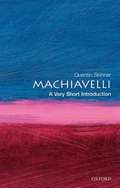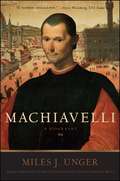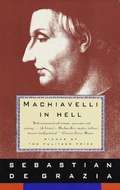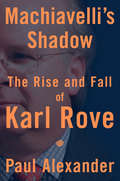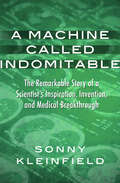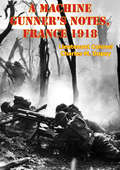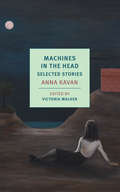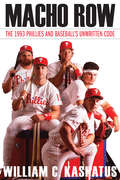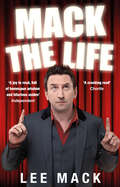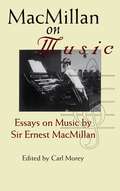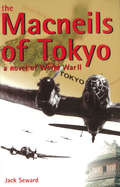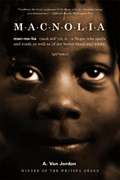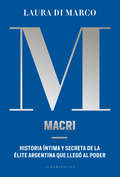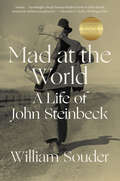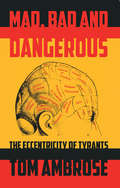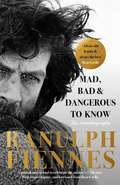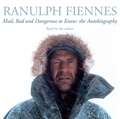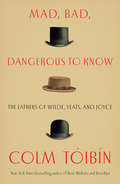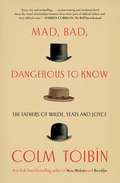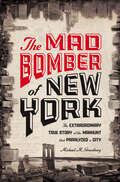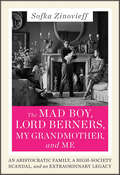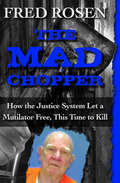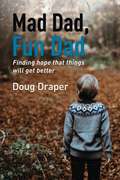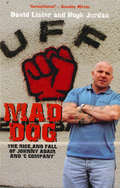- Table View
- List View
Machiavelli: A Very Short Introduction
by Quentin SkinnerI think of Machiavelli essentially as the exponent of a neo-classical form of humanist political thought. I argue in addition that the most original and creative aspects of his political vision are best understood as a series of polemical -- sometimes even satirical -- reactions against the humanist assumptions he inherited and basically continued to endorse. While my principal aim has been to provide a straightforward introduction to Machiavelli's views on statecraft, I hope that this interpretation may also be of some interest to specialists in the field.
Machiavelli
by Miles J. UngerHe is the most infamous and influential political writer of all time. His name has become synonymous with cynical scheming and the selfish pursuit of power. Niccolò Machiavelli, Florentine diplomat and civil servant, is the father of political science. His most notorious work, The Prince, is a primer on how to acquire and retain power without regard to scruple or conscience. His other masterpiece, The Discourses, offers a profound analysis of the workings of the civil state and a hardheaded assessment of human nature. Machiavelli's philosophy was shaped by the tumultuous age in which he lived, an age of towering geniuses and brutal tyrants. He was on intimate terms with Leonardo and Michelangelo. His first political mission was to spy on the fire-and-brimstone preacher Savonarola. As a diplomat, he matched wits with the corrupt and carnal Pope Alexander VI and his son, the notorious Cesare Borgia, whose violent career served as a model for The Prince. His insights were gleaned by closely studying men like Julius II, the "Warrior Pope," and his successor, the vacillating Clement VII, as well as two kings of France and the Holy Roman Emperor. Analyzing their successes and failures, Machiavelli developed his revolutionary approach to power politics. Machiavelli was, above all, a student of human nature. In The Prince he wrote a practical guide to the aspiring politician that is based on the world as it is, not as it should be. He has been called cold and calculating, cynical and immoral. In reality, argues biographer Miles Unger, he was a deeply humane writer whose controversial theories were a response to the violence and corruption he saw around him. He was a psychologist with acute insight into human nature centuries before Freud. A brilliant and witty writer, he was not only a political theorist but also a poet and the author of La Mandragola, the finest comedy of the Italian Renaissance. He has been called the first modern man, unafraid to contemplate a world without God. Rising from modest beginnings on the strength of his own talents, he was able to see through the pious hypocrisy of the age in which he lived. Miles Unger has relied on original Italian sources as well as his own deep knowledge of Florence in writing this fascinating and authoritative account of a genius whose work remains as relevant today as when he wrote it.
Machiavelli in Hell
by Sebastian De GraziaIn this intellectual biography, de Grazia presents a new vision of Niccolo Machiavelli that evokes the great Florentine thinker's presence. After giving an engrossing account of Machiavelli's childhood and period of personal crisis that followed his imprisonment and torture, the book turns to an examination of The Prince.<P><P> Pulitzer Prize Winner
Machiavelli's Shadow: The Rise and Fall of Karl Rove
by Paul AlexanderKarl Rove has come to personify scorched earth political tactics and merciless, win-at-any-cost trickery. His status as the so-called architect behind Bush's election victories has elevated him to a mythic kingmaker in the national imagination. Not since Mark Hanna, special assistant to President William McKinley, has someone not elected to public office played such a vital role in the governance of our nation. We know the myth, but who is the man? In Machiavelli's Shadow, the full, unvarnished truth about the mastermind of the Bush administration is revealed as swirling scandals and Karl Rove's diminished power have freed people to speak candidly as never before. Acclaimed author and veteran journalist Paul Alexander tracks Rove's journey from consummate outsider to presidential consigliere, conducting firsthand interviews with A-list sources who have never gone on the record about Rove before now. The result is a gripping, no-holds-barred account of the man whose insistence on politicizing any area on which he has advised the president—from the war in Iraq to domestic issues like Social Security, energy, the environment, and hotly controversial judicial matters—has brought about his own fall from grace and an escalating crisis within the government and the nation. Drawing on the author's extensive connections in the political arena and delving into all areas of Rove's life—political, business, psychological, and personal—this book stands as the definitive portrait of one of the most fascinating figures ever to emerge on the American political scene.
A Machine Called Indomitable: The Remarkable Story of a Scientist's Inspiration, Invention, and Medical Breakthrough
by Sonny KleinfieldThe true story of the doctor who invented the MRI: &“A fascinating account of how a significant medical development came about&” (The New York Times). Dr. Raymond Damadian was plagued with a mysterious and persistent stomach pain, yet physicians assured him that they could find nothing wrong. To find the answer to his ailment, Damadian would spend the ensuing twelve years building a machine that would change medicine. Nuclear magnetic resonance scanning, now called magnetic resonance imaging (MRI), was a revolution: a safe means to determine the makeup of every cell in the human body, distinguishing healthy cells from sick. Although Damadian&’s ideas were met with skepticism and outright opposition from the medical community, this machine would go on to save the lives of millions by diagnosing disease while effective treatment was still possible. In short, it was a medical miracle. The story of Damadian&’s quest—battling skeptical peers, money troubles, and more with an intensity approaching obsession—is one of the great legends of medical research. Sonny Kleinfield, acclaimed reporter and author, captures Damadian&’s remarkable triumph against the odds with compassion and a keen eye. A Machine Called Indomitable is scientific storytelling at its finest.
Machine Gunner’s Notes, France 1918 [Illustrated Edition]
by Lieutenant Colonel Charles M. DupuyIncludes The Americans in the First World War Illustration Pack - 57 photos/illustrations and 10 mapsWhen the United States entered the First World War in 1917 the size of the army was tiny in comparison to the European Powers. The long-serving officers of the U.S. army faced the daunting task of licking the new recruits of 1917 into shape for service overseas. Among these officers was Charles Dupuy who was charged with getting his men ready for battle utilising the weapon that had inflicted so much damage during the previous three years - the machine gun. Key to offence or defence, the machine gun companies of the U.S. expeditionary force had to be fast and deadly in the offence and staunch and steadfast in defence. Major Dupuy tells of how he whipped his men into shape and led them to hard fought victory against the Germans on the Western front in 1918.
Machines in the Head: Selected Stories
by Anna KavanEnter the strange and haunting world of Anna Kavan, author of mind-bending stories that blend science fiction and the author's own harrowing experiences with drug addiction, in this new collection of her best short stories.Anna Kavan is one of the great originals of twentieth-century fiction, comparable to Leonora Carrington and Jean Rhys, a writer whose stories explored the inner world of her imagination and plumbed the depths of her long addiction to heroin. This new selection of Kavan&’s stories gathers the best work from across the many decades of her career, including oblique and elegiac tales of breakdown and institutionalization from Asylum Piece (1940), moving evocations of wartime from I Am Lazarus (1945), fantastic and surrealist pieces from A Bright Green Field (1958), and stories of addiction from Julia and the Bazooka (1970). Kavan&’s turn to science fiction in her final novel, Ice, is reflected in her late stories, while &“Starting a Career,&” about a mercenary dealer of state secrets, is published here for the first time. Kavan experimented throughout her writing career with results that are moving, funny, bizarre, poignant, often unsettling, always unique. Machines in the Head offers American readers the first full overview of the work of a fearless and dazzling literary explorer.
Macho Row: The 1993 Phillies and Baseball's Unwritten Code
by William C. KashatusColorful, shaggy, and unkempt, misfits and outlaws, the 1993 Phillies played hard and partied hard. Led by Darren Daulton, John Kruk, Lenny Dykstra, and Mitch Williams, it was a team the fans loved and continue to love today. Focusing on six key members of the team, Macho Row follows the remarkable season with an up-close look at the players’ lives, the team’s triumphs and failures, and what made this group so unique and so successful. With a throwback mentality, the team adhered to baseball’s Code. Designed to preserve the moral fabric of the game, the Code’s unwritten rules of the game formed the bedrock of this diehard team whose players paid homage and respect to the game at all times. Trusting one another and avoiding ideas of superstardom, they consistently rubbed the opposition the wrong way and didn’t care. William C. Kashatus pulls back the covers on this old-school band of brothers, depicting the highs and lows and their brash style while also digging into the suspected steroid use of players on the team. Macho Row is a story of winning and losing, success and failure, and the emotional highs and lows that accompany them.
Mack The Life: Enhanced Edition
by Lee Mack‘His book is a joy to read, full of homespun wisdom and hilarious asides’ Independent____________________Where do comedians come from? Why is it that one person is a funny bloke down the pub while another actually makes a living by standing up in front of an audience telling jokes? And where does all that material come from? Well, young Lee McKillop used to wonder that too.___________________ Growing up in his parents’ pub, small and wiry in a world of bigger and chunkier specimens, Lee quickly learned that cracking jokes was a way to get attention. After a somewhat random series of jobs, which included being Red Rum’s stableboy and a bingo hall barman, it was as a Great Yarmouth holiday camp entertainer that he had his first crack at telling jokes on stage. It got him some laughs, the sack and a punch in the face.*Now, as Lee Mack, he’s one of our best loved and most successful comedians, both as a live stand-up and on television. In Mack the Life, Lee tells the story of how he got there and gives extraordinary insight into what really makes comics tick. Hilarious and brilliant, it’s the kind of book which reminds you why you learned to read in the first place.*Nearly.
MacMillan on Music: Essays by Sir Ernest MacMillan
by Ernest Macmillan Carl MoreyIn addition to his activities as conductor, administrator, educator, composer, and organist, Sir Ernest MacMillan (1893-1973) found time to write more than one hundred essays and lectures on music. Always ready to use his enormous prestige to further the causes of music, MacMillan took every opportunity to admonish Canadians to develop our own composers, to honour our own performers, to educate our children musically, and to offer opportunities for all to hear, learn about, and enjoy great music.This selection of twenty essays and lectures covers the period from 1928 to 1964, and ranges over the gamut of MacMillan’s life and interests: the cause of the Canadian composer; music education for adults as well as children; critical reviews; his early years as an organist; internment in a German prison camp during the First World War; Shakespeare and music; church music; and the lighter side in two humorous send-ups of academic lectures on Bach and Wagner. Here is a panorama of music over thirty-five years at mid-century, through the eyes of one of Canada’s most brilliant and all-embracing musicians.
The Macneils of Tokyo
by Jack SewardIn the absorbing, epic tradition of The Winds of War, author Jack Seward presents a new novel of war, passion, and divided family loyalties. The MacNeil family is torn apart by the horrors of war, which is consuming Asia as strife, intrigue, and romance inevitably follow. Like its predecessor, The MacNeils of Nagasaki, this lively novel is a storytelling gem from a prolific author, a perfect beach read for all lovers of family sagas, historical fiction, and gripping adventure novels.
Macnolia
by A. Van JordanIn 1936, teenager MacNolia Cox became the first African American finalist in the National Spelling Bee Competition. Supposedly prevented from winning, the precocious child who dreamed of becoming a doctor was changed irrevocably. Her story, told in a poignant nonlinear narrative, illustrates the power of a pivotal moment in a life.
Macri: Historia íntima y secreta de la élite argentina que llegó al poder
by Laura Di MarcoPor primera vez, Mauricio Macri habla para contar como nunca antes el detrás de escena del nuevo poder en la Argentina. La difícil relación con su padre, los amigos de la infancia que hoy son funcionarios, asesores o empresarios. Los secretos más íntimos y polémicos del hombre que sorprendió a todos. Este libro desnuda a un Macri privado y sin filtro: un presidente que en su más profunda intimidad padece el poder, y que empujado por un mandato inconfesable llega inesperadamente a la Casa Rosada para destronar al populismo. Ilumina las contradicciones de un líder extraño, que a menudo va contra el establishment al que él mismo pertenece. Devela la trama íntima de un joven educado para convertirse en el heredero de un sospechado emporio económico, que un día decide torcer su propio destino enfrentando a un padre narcisista, que siempre buscó anularlo. Descubre la trastienda del poder a través de las sesiones con su psicoanalista, José Luis Ahumada; el entrenamiento con el coach oculto del Pro, Alberto "Tito" Lederman; y el decisivo encuentro con quien fue el desconocido terapeuta de Alfonsín, Eduardo Issaharoff. Muestra la verdadera influencia de Jaime Durán Barba y de su mejor discípulo, Marcos Peña. Y cómo la filosofía budista formatea su concepción de la política. También se zambulle en el elenco de figuras del nuevo poder y narra la evolución de la élite argentina y de sus ideas: una clase dirigente que se fue aggiornando hasta acoplarse a aliados impensables, como los radicales y la Coalición Cívica de Elisa Carrió. Laura Di Marco ha escrito el primer gran libro político desde que Mauricio Macri llevó a la élite argentina al poder. Una historia cautivante, que arranca en la madrugada previa a su asunción, cuando su círculo de amigos decide "tomar" en secreto la Casa Rosada. Con asombrosos encuentros cara a cara con Macri y más de sesenta entrevistas a su entorno íntimo, Di Marco cuenta esta saga con el virtuosismo de los grandes periodistas literarios. Una investigación imprescindible para entender qué pasó en la Argentina en 2015 y encontrar claves hacia el futuro.
Mad at the World: A Life Of John Steinbeck
by William SouderA resonant biography of America’s most celebrated novelist of the Great Depression. The first full-length biography of the Nobel laureate to appear in a quarter century, Mad at the World illuminates what has made the work of John Steinbeck an enduring part of the literary canon: his capacity for empathy. Pulitzer Prize finalist William Souder explores Steinbeck’s long apprenticeship as a writer struggling through the depths of the Great Depression, and his rise to greatness with masterpieces such as The Red Pony, Of Mice and Men, and The Grapes of Wrath. Angered by the plight of the Dust Bowl migrants who were starving even as they toiled to harvest California’s limitless bounty, fascinated by the guileless decency of the downtrodden denizens of Cannery Row, and appalled by the country’s refusal to recognize the humanity common to all of its citizens, Steinbeck took a stand against social injustice—paradoxically given his inherent misanthropy—setting him apart from the writers of the so-called "lost generation." A man by turns quick-tempered, compassionate, and ultimately brilliant, Steinbeck could be a difficult person to like. Obsessed with privacy, he was mistrustful of people. Next to writing, his favorite things were drinking and womanizing and getting married, which he did three times. And while he claimed indifference about success, his mid-career books and movie deals made him a lot of money—which passed through his hands as quickly as it came in. And yet Steinbeck also took aim at the corrosiveness of power, the perils of income inequality, and the urgency of ecological collapse, all of which drive public debate to this day. Steinbeck remains our great social realist novelist, the writer who gave the dispossessed and the disenfranchised a voice in American life and letters. Eloquent, nuanced, and deeply researched, Mad at the World captures the full measure of the man and his work.
Mad, Bad and Dangerous: The Eccentricity of Tyrants
by Tom AmbroseA penetrating and incisive study of the fanaticism and foibles of some of history's most illustrious namesFrom Assad to Nero, Gaddafi to Ivan The Terrible, this work attempts a thorough illumination of the minds of some of the most powerful people in history. While leaving some room to describe the amusing incidents and eccentricities associated with a host of men and women of power, it also reaches into the terrifying depths and depravities of minds that shaped the destinies of peoples and nations. Using a unique combination of history, politics, and psychology, this book fully describes how power not only corrupts but deranges.
Mad, Bad and Dangerous to Know: Captain Scott - Mad, Bad And Dangerous To Know And Mad, Dogs And Englishmen
by Ranulph FiennesRanulph Fiennes has travelled to the most dangerous and inaccessible places on earth, almost died countless times, lost nearly half his fingers to frostbite, raised millions of pounds for charity and been awarded a polar medal and an OBE. He has been an elite soldier, an athlete, a mountaineer, an explorer, a bestselling author and nearly replaced Sean Connery as James Bond.In his autobiography he describes how he led expeditions all over the world and became the first person to travel to both poles on land. He tells of how he discovered the lost city of Ubar in Oman and attempted to walk solo and unsupported to the North Pole - the expedition that cost him several fingers, and very nearly his life. His most recent challenge was scaling the north face of the Eiger, one of the most awesome mountaineering challenges in the world. Sir Ranulph Twisleton-Wykeham-Fiennes OBE, 3rd Baronet, looks back on a life lived at the very limits of human endeavour.'Even readers with a broadly low tolerance for macho heroism will find themselves gripped . . . compelling' - Time Out
Mad, Bad and Dangerous to Know: Updated and revised to celebrate the author's 75th year
by Ranulph FiennesRanulph Fiennes has travelled to the most dangerous and inaccessible places on earth, almost died countless times, lost nearly half his fingers to frostbite, raised millions of pounds for charity and been awarded a polar medal and an OBE. He has been an elite soldier, an athlete, a mountaineer, an explorer, a bestselling author and nearly replaced Sean Connery as James Bond.In his autobiography he describes how he led expeditions all over the world and became the first person to travel to both poles on land. He tells of how he discovered the lost city of Ubar in Oman and attempted to walk solo and unsupported to the North Pole - the expedition that cost him several fingers, and very nearly his life. His most recent challenge was scaling the north face of the Eiger, one of the most awesome mountaineering challenges in the world. Sir Ranulph Twisleton-Wykeham-Fiennes OBE, 3rd Baronet, looks back on a life lived at the very limits of human endeavour.'Even readers with a broadly low tolerance for macho heroism will find themselves gripped . . . compelling' - Time Out
Mad, Bad and Dangerous to Know: Updated and revised to celebrate the author's 75th year
by Ranulph FiennesRanulph Fiennes has travelled to the most dangerous and inaccessible places on earth, almost died countless times, lost nearly half his fingers to frostbite, raised millions of pounds for charity and been awarded a polar medal and an OBE. He has been an elite soldier, an athlete, a mountaineer, an explorer, a bestselling author and nearly replaced Sean Connery as James Bond. In his autobiography he describes how he led expeditions all over the world and became the first person to travel to both poles on land. He tells of how he discovered the lost city of Ubar in Oman and attempted to walk solo and unsupported to the North Pole - the expedition that cost him several fingers, and very nearly his life. His most recent challenge was scaling the north face of the Eiger, one of the most awesome mountaineering challenges in the world. Sir Ranulph Twisleton-Wykeham-Fiennes OBE, 3rd Baronet, looks back on a life lived at the very limits of human endeavour. (P)2007 Hodder & Stoughton Audiobooks
Mad, Bad, Dangerous to Know: The Fathers of Wilde, Yeats, and Joyce
by Colm ToibinAward-winning author Colm Tóibín turns his incisive gaze to three of the world's greatest writers, Oscar Wilde, W.B. Yeats, and James Joyce, and their earliest influences: their fathers."A father...is a necessary evil." Stephen Dedalus in UlyssesIn Mad, Bad, Dangerous to Know, Colm Tóibín illuminates not only the complex relationships between three of the greatest writers in the English language and their fathers, but also illustrates the surprising ways they surface in their work. <P><P>From Wilde's doctor father, a brilliant statistician and amateur archaeologist, who was taken to court by an obsessed lover in a strange premonition of what would happen to his son; to Yeats' father, an impoverished artist and brilliant letter-writer who could never finish a painting; to John Stanislaus Joyce, a singer, drinker, and storyteller, a man unwilling to provide for his large family, whom his son James memorialised in his writing, Mad, Bad, Dangerous to Know brilliantly combines biography and literary appreciation and is a revealing, personal new look at the lives of three major literary icons.
Mad, Bad, Dangerous to Know: The Fathers of Wilde, Yeats and Joyce
by Colm ToibinFrom Colm Tóibín, the formidable award-winning author of The Master and Brooklyn, an illuminating, intimate study of Irish culture, history, and literature told through the lives and work of three men—William Wilde, John Butler Yeats, and John Stanislaus Joyce—and the complicated, influential relationships they had with their complicated sons.Colm Tóibín begins his incisive, revelatory Mad, Bad, Dangerous to Know with a walk through the Dublin streets where he went to university—a wide-eyed boy from the country—and where three Irish literary giants also came of age. Oscar Wilde, writing about his relationship with his father, William Wilde, stated: “Whenever there is hatred between two people there is bond or brotherhood of some kind…you loathed each other not because you were so different but because you were so alike.” W.B. Yeats wrote of his father, John Butler Yeats, a painter: “It is this infirmity of will which has prevented him from finishing his pictures. The qualities I think necessary to success in art or life seemed to him egotism.” John Stanislaus Joyce, James’s father, was perhaps the most quintessentially Irish, widely loved, garrulous, a singer, and drinker with a volatile temper, who drove his son from Ireland. Elegant, profound, and riveting, Mad, Bad, Dangerous to Know illuminates not only the complex relationships between three of the greatest writers in the English language and their fathers, but also illustrates the surprising ways these men surface in their work. Through these stories of fathers and sons, Tóibín recounts the resistance to English cultural domination, the birth of modern Irish cultural identity, and the extraordinary contributions of these complex and masterful authors.
The Mad Bomber of New York: The Extraordinary True Story of the Manhunt That Paralyzed a City
by Michael M. Greenburg“Gripping and bizarre . . . A compelling account of a dangerously angry man and the investigation that helped to revolutionize modern police work.” —Kirkus ReviewsBetween 1940 and 1957, thirty-three bombs—strategically placed in Grand Central Terminal, Penn Station, Radio City Music Hall, Macy’s, and other crowded areas of New York—paralyzed the city, sending shockwaves of fear through the public.George Metesky, the “Mad Bomber,” unleashed a reign of terror that reverberated through America’s social, legal, and political landscape, ultimately spurring the birth of modern criminal profiling when a psychiatrist was called in to assist in the manhunt. A compelling work of historical true crime, The Mad Bomber of New York is the gripping tale of two individuals engaged in a deadly game of hide-and-seek, with the city of New York caught in the crosshairs.“A full-fledged biography that evokes the chaos and media circus that the terrorist, George P. Metesky, engendered.” —The New York Times“Masterfully told . . . a first-rate true-crime story.” —Scott Christianson, author of Bodies of Evidence
The Mad Boy, Lord Berners, My Grandmother, and Me: An Aristocratic Family, a High-Society Scandal, and an Extraordinary Legacy
by Sofka ZinovieffLike The Bolter and Portrait of a Marriage, this beguiling, heady tale of a scandalous ménage à trois among England's upper classes combines memoir and biography to re-create an unforgettably decadent world.Among the glittering stars of British society, Sofka Zinovieff's grandparents lived and loved with abandon. Robert Heber-Percy was a dashing young man who would rather have a drink than open a book, so his involvement with Jennifer Fry, a gorgeous socialite famous for her style and charm, was not surprising. But by the time Robert met and married Jennifer, he had already been involved with a man—Gerald, Lord Berners—for more than a decade.Stout, eccentric and significantly older, Gerald was a composer, writer and aesthete—a creative aristocrat most at home in the company of the era's best and brightest minds. He also owned one of Britain's loveliest stately homes, Faringdon House, in Oxfordshire, which under his stewardship became a beacon of sybaritic beauty. Robert and Gerald made an unlikely couple, especially because they lived together at Faringdon House when homosexuality was illegal. And then a pregnant Jennifer moved into Faringdon in 1942, creating a formidable ménage à trois.In this gorgeous, entertaining narrative of bohemian aristocracy, Sofka Zinovieff probes the mysteries of her grandparents and the third man in their marriage: Gerald, the complex and talented heir to a legendary house, its walls lined with priceless art and its gardens roamed by a bevy of doves, where he entertained everyone from Igor Stravinsky to Gertrude Stein. What brought Robert and Jennifer together under his roof, and why did Jennifer stay—and marry Robert? Blending memoir and biography in her quest to lay old ghosts to rest, Zinovieff pieces together the complicated reality behind the scandals of revelry and sexuality. The resulting story, defined by keen insight, deep affection and marvelous wit, captures the glory and indulgence of the age, and explores the many ways in which we have the capacity to love.
The Mad Chopper: How the Justice System Let a Mutilator Free, This Time to Kill
by Fred RosenThe author of the true crime &“masterpiece&” Lobster Boy traces a brutal killer&’s history across two decades of slipping past the legal system (The Guardian). When police in Tampa, Florida, arrested Larry Singleton in 1997 for brutally murdering prostitute Roxanne Hayes, they soon realized it wasn&’t the man&’s first violent attack. Back in 1978 he had gained notoriety as &“the Mad Chopper&” for raping and cutting off the arms of 15-year-old Mary Vincent on a patch of desolate, sun-scorched land 5 miles off the highway near Modesto, California. When Singleton was let out of prison on supervised parole after serving only 8 years for his crimes, no community in California would accept him. He eventually moved back to his home in Florida, where he killed Hayes nearly 20 years after his original crime. But his first victim, Vincent, had survived, walking nearly a mile to get help after the assault, and testified against him at his trial for murdering Hayes.
Mad Dad, Fun Dad: Finding Hope that Things will Get Better
by Doug DraperFrom an early age, Ben Baker knows that “when dad is mad, someone is going to get hurt.” He sees it when his father bashes his mother in the head with a shotgun and experiences it through frequent beatings with brooms, rakes or whatever tool is handy. The physical pain is matched by the emotional damage of his father repeatedly calling him “the stupidest and laziest boy in the world.” This mistreatment takes place while working on the family farm and at his father’s service station in a small town located on the foothills of Utah’s Wasatch Mountains. As the smallest boy in his class, Ben also faces abuse at school because bullies find him to be an easy target for punches, kicks and insults. He deals with the cruelty by keeping his back to the wall and doing whatever he can to dodge the bullies. <P><P> His run-and-hide approach changes when an ex-convict, Derek Dean, takes a job pumping gas at his father’s service station. Derek teaches Ben how to deliver the pain instead of being the one who feels it. Ben applies what he learns and lashes out with unbridled fury. He uses a steel pipe to humiliate a pair of bigger opponents and knocks out another bully with a viscous kick to the head. Besides getting him in trouble at school, Ben worries that his anger-fueled actions will lead him to become like his father. <P>His mind becomes a battlefield, with a wish to live peacefully fighting against a ruthless desire to punish anyone who messes with him. Ben’s relationship with Derek shifts from friend to foe when he catches Derek stealing his father’s truck and tools. After Derek spends five years in prison for theft, he returns to Alma seeking revenge. While Ben is on a camping trip with his Boy Scout troop, Derek and two friends confront him and promise to make Ben pay for his role in sending Derek back to prison. With this threat weighting heavily on his mind, Ben reacts with violence to a cruel prank pulled on him by his fellow scouts and finds himself in trouble again. Frustrated, he decides to escape all his problems by running away and living off the land. Before launching his secret plan, Ben chats with his scoutmaster who encourages Ben to rely on God to help him deal with his challenges. The scoutmaster also promises to pray for Ben. When he runs away, Ben soon needs all the help he can get. Once again, he crosses paths with Derek and a chase through the mountains begins, with Ben leading the vengeful ex-convict on an overnight hike during a powerful snowstorm. Instead of having to merely face punishment for his angry outburst at the scout camp, Ben’s attempt to escape brings him to the point of death. While frightening and painful, this battle for survival becomes a turning point in Ben’s life. It plants a seed of hope in him that things will get better. Ben’s struggles continue, but he moves forward equipped with new strength. His story provides a compelling example of the power of faith and prayer in changing lives. For Ben, it means breaking the cycle of violence, replacing despair with hope and finding peace in a combative world.
Mad Dog: The Rise and Fall of Johnny Adair and 'C Company'
by David Lister Hugh JordanA mindless sectarian psychopath or a loyalist folk hero who took the war to the IRA's front door? The name Johnny 'Mad Dog' Adair is synonymous with a killing spree by loyalist terrorists that took Northern Ireland to the brink of civil war.From humble beginnings as a rioter and glue-sniffer on Belfast's Shankill Road, Adair rose through the ranks of the outlawed Ulster Freedom Fighters to head its merciless killing machine, 'C Company'. Surrounded by a group of trusted friends, his reign of terror in the early 1990s claimed the lives of up to 40 Catholics, picked out at random as Adair's hitmen roamed Belfast. Determined to lead from the front, his men even fired a rocket at Sinn Fein's headquarters, writing themselves into loyalist mythology and embarrassing the IRA in its republican heartland. Its desperate attempts to kill Adair culminated in October 1993, when a bomb on the Shankill Road, intended for the loyalist godfather, claimed the lives of nine Protestant civilians. Mad Dog: The Rise and Fall of Johnny Adair and 'C Company' describes in graphic detail Adair's criminal empire and an egomaniac's bloody war against Catholics and anybody else who got in his way. Adair's friends and enemies talk for the first time about the murders he ordered, his sordid personal life, and his attempts - ultimately disastrous - to become Northern Ireland's supreme loyalist figurehead.
